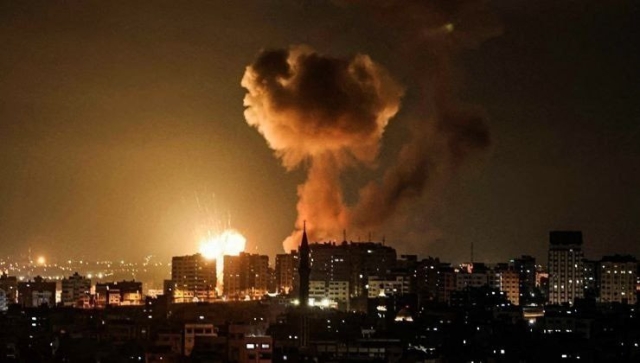As the 20th day of the war unfolds in Israel, a persistent series of airstrikes continues to target Hamas and Hezbollah terrorist cells in both Gaza and southern Lebanon. Moreover, Israeli military forces, including tanks and infantry soldiers from the Givati Brigade, have initiated a raiding operation within the Gaza Strip, signaling a potential full-scale ground operation on the horizon.
Upon reaching the entrance of the Gaza Strip, IDF (Israel Defense Forces) units engaged in fierce battles with terrorists. During this operation, they successfully identified and neutralized numerous terrorists, dismantled key terrorist infrastructure, and eliminated anti-tank positions while also working to restore order to the area. The mission concluded with the Israeli forces withdrawing from the zone.
כוחות של צה"ל ביצעו הלילה פשיטה ממוקדת בצפון רצועת עזה, כחלק מהכנת המרחב לשלבי הלחימה הבאים@ItayBlumental pic.twitter.com/ii7MDPYm4N
— כאן חדשות (@kann_news) October 26, 2023
In parallel, overnight operations saw the IDF launching attacks on hundreds of terror targets within the Gaza Strip. These targets included terrorist headquarters, tunnel openings, and anti-tank posts. These operations also resulted in the elimination of several terrorists. The IDF continues its preparations for a ground incursion, emphatically conveying to its ground forces that such an operation is imminent, addressing the myriad questions arising among the troops on this 20th day of the conflict.
The IDF spokesperson reported that, within the past day, fighter jets executed strikes on over 250 Hamas targets within the Gaza Strip. These targets encompassed terrorist infrastructure, operational command centers, tunnel access points, and rocket launchers deliberately positioned within civilian areas. Notably, one aerial formation of the terrorist organization was identified in the vicinity of Khan Yunis, near a mosque and kindergarten, highlighting the deliberate use of civilian shields.
Meanwhile, in the northern sector along the Lebanese border, the IDF successfully intercepted an air-to-ground missile launched from Lebanese territory. The air defense unit swiftly neutralized the missile, which had been aimed at an IDF remotely piloted aircraft. Shortly thereafter, an Israeli Air Force aircraft launched a retaliatory attack on the source of the missile launch within Lebanese territory.
Mike Johnson Pledges Support for Israel in New Role
— Adam Albilya - אדם אלביליה (@AdamAlbilya) October 26, 2023
Mike Johnson, the leader of the U.S. House of Representatives promises to back Israel and condemns Hamas as barbaric and unacceptable, vowing support for the righteous side in the conflict. pic.twitter.com/tBwQwtSH76
In a significant development on the domestic front, the Israeli government, in response to the ongoing crisis, conducted an urgent telephone poll resulting in the allocation of 105 million NIS (New Israeli Shekels) for emergency aid. This aid is intended to support local authorities near the northern border and the areas surrounding the Gaza Strip. It also aims to assist local authorities whose residents were not evacuated and are thus contending with the ongoing emergency. Of the allocated funds, 35 million NIS will go to townships within 0-5 kilometers of the northern border, while the remaining 70 million NIS will be directed toward villages surrounding the Gaza Strip, located within 0-7 kilometers of the border, as well as the residents of Sderot. It is worth noting that a portion of the budget for this emergency aid will be sourced from funds earmarked for the implementation of coalition agreements.
Here, we have 2 Palestinian genocidal terrorist squatter that were captured, and this what Israel did to them...#Gaza_Genocide of jews will end. pic.twitter.com/JsjAjISdWy
— Nakba (@VictorNakba) October 25, 2023
On the international front, the United States House of Representatives took a decisive stance by passing a resolution that strongly condemns Hamas while reaffirming unequivocal U.S. support for Israel. The resolution garnered overwhelming bipartisan support, with 412 representatives in favor and only 10 opposed. The resolution specifically denounces Iran's backing of Hamas and Islamic Jihad and calls for the imposition of sanctions against Iran as a consequence of its support for these terrorist organizations.


